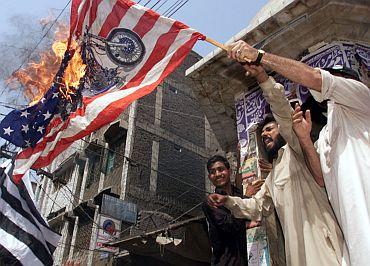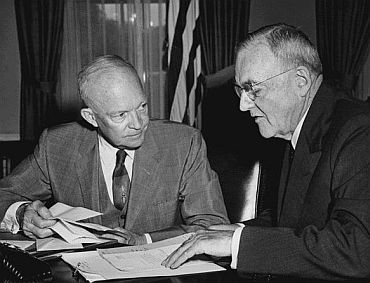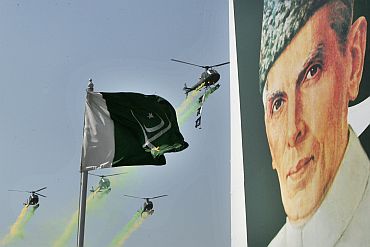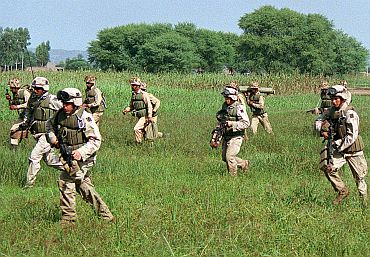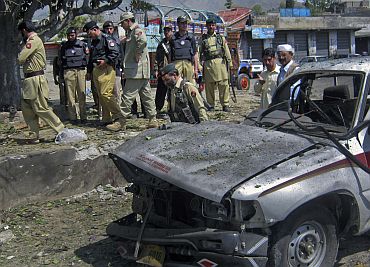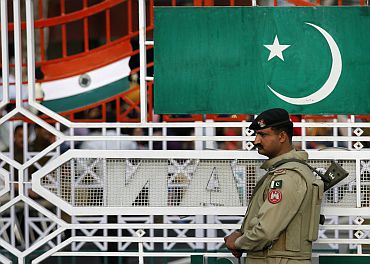 | « Back to article | Print this article |
Truth about Pak: US to be blamed for its double game
'Those who cannot learn from history are condemned to repeat it.' If ever there was a poetic affirmation of philosopher George Santayana's time-worn aphorism, it is the saga of United States policy toward Pakistan -- from its inception over 60 years ago until the death of Osama bin Laden in Abbottabad, says Harold A Gould.
It is a judgment that cuts both ways. Neither Pakistan nor the US ever learned from their past mistakes and the consequences are there for all to see; history has repeated itself -- not once, but several times.
 |
Reggie Sinha has recently summed it all up in a single crisp sentence: 'When will the American leadership,' he declared, 'realise the true cost of (Pakistan's) double game?'
But the plea can equally be made in the opposite direction: When will the American leadership face the fact that it was US policies that put Pakistan in the position to play its double game?
The events which led up to Abbottabad did not happen yesterday or a decade ago or even two decades ago. They have their roots and their origins in the American decision following World War II to bring the emerging Cold War to South Asia.
Harold A Gould is a veteran South Asia expert
Please click NEXT to read more...
Pak was an ideal 'fit' for US' 'one-size-fits-all' strategic orientation
This occurred on a systematic basis after the rise of John Foster Dulles as secretary of state in1956, with all he represented morally and politically (his Cold War-driven anti-Communist obsessions, his Episcopalian moral certitudes).
He became the architect, under the rubric of the incoming Republican Eisenhower administration, of a US policy that naively accommodated and enabled all of the political pathologies that were afflicting Pakistan from its inception at the time of partition, and which facilitated the emergence of an 'Islamic State' whose political culture was compounded of an archaic colonial administrative class, feudal landlords, increasingly strident Islamic ideologues, remnants of the Muslim League which had migrated from India (Muhajirs), and an ethnically predominant Punjabi military class determined to mold these diverse elements into an authoritarian State dedicated to the suppression of democracy and to waging a perpetual war of revenge against a hated 'Hindu' India.
By the 1950s, America entered the South Asia scene consumed by phobic anti-Communism and consequent Cold War strategic compulsions (so-called 'containment') that took precedence over regional socio-historical considerations and specificities.
There occurred a 'one-size-fits-all' strategic orientation which reduced all regional venues to a single militarised grand strategy.
Pakistan was an ideal 'fit' for this orientation because it was controlled by a military class that was willing to be whatever US cold warriors wanted them to be since their own ideological commitment to the Dulles version of anti-Communism was only skin deep.
They would do and be whatever it took to acquire the means to achieve their elemental goal -- the conquest of India. Ayub Khan was indeed quoted to this effect!
American distortion: No trace of Soviet Communism in Pak
This was a crucial distortion in the South Asian case because no credible basis for Soviet Bloc Communism ever existed there.
The predominant South Asian State, India, under Jawaharlal Nehru's political leadership and Mahatma Gandhi's inspirational tutelage, had opted for Westminster democracy, combined with religious secularism, and a mixed socialist and capitalist economy.
The country's military was fully subordinated to civilian authority and completely apolitical; extremist political groups both on the Right (Hindu and Muslim fundamentalists) and on the Left (Communists and Naxalites) were confined to the political fringe.
Although Pakistan, after Mohammad Ali Jinnah, steadily moved towards a sociopolitical system that eschewed liberal democracy, cultural pluralism and religious tolerance -- the ingredients that assured India's political success -- leading ultimately to a military-dominated state, it was never susceptible to dominance by or absorption into the Soviet sphere because its underlying Islamic cultural fabric was totally antithetical to Marxist-Leninist dialectical materialism.
It was, in fact, precisely this predilection which whetted the Dullesean appetite for a Cold War partner in South Asia: a State with formidable military potential combined with 'organic' anti-Communist credentials -- superficially: Cold warriors par excellence!
US created a fantasy about the Pak of their strategic dreams
This happened not only because America's leaders were pathetically ignorant of the South Asia region's history, culture and emerging political realities at the point of their initial decision following World War II to become strategically involved in the region, but even more because they failed to learn from their initial mistakes as they went along.
Instead they created a fantasy about the Pakistan of their strategic dreams -- a stalwart anti-Communist bastion in South Asia -- nurtured with billions of dollars worth of military and economic goodies regardless of abundant indications that the real Pakistan was a deeply troubled State incapable of living up to the cold warriors' aspirations for it.
President Eisenhower himself testified to this in a National Security Council meeting.
Fortunately for both parties, but not for the future of South Asia, America's global strategic fantasies mutually reinforced the Pakistani elite's political fantasies.
It allowed their leaders to delude themselves into believing that feigning anti-Communism in order to join America's anti-Communist crusade would win for them a de facto military alliance with the US, which would afford them the military, economic and diplomatic resources they sought -- not to defend South Asia against Soviet Bloc imperialism, but to enable them to wage war against India.
US support to Pak was limited to US interests alone
It can be said that General Ayub Khan built his domestic political credibility upon this fantasy. It came crashing down in 1965 when America stood by and allowed Pakistan's quixotic invasion of India to fail, thereby making it clear that America's support of Pakistan after all was limited to American interests alone.
This scenario was repeated in the 1971 Bangladesh war and again at Kargil.
The bitterness flowing from the intrusion of reality into the Pakistani leadership's paranoid delusions persists to this day and accounts for their inability to resolve the political pathologies which have made them the international clearing house for Islamic terrorism, and hosts to murderous fanatics like Osama bin Laden, Mullah Omar, Aiman Zawahiri, Lashkar-e-Tayiba, etc, instead of healthy participants in the global economy like its hated neighbour India.
America's culpability in the current condition of the Pakistani State arises from one simple fact: The disastrous decision back in the1950s to recruit Pakistan into the Cold War which set off a chain reaction of militarism, corruption' and flirtation with Islamic extremism; it led inexorably through four periods of military dictatorship (Ayub, Yahya, Zia and Musharraf), through weak and truncated attempts to establish viable civil society, massive corruption, sporadic economic development, epidemic political duplicity towards its principal benefactor (the US), debilitating dalliances with politically diseased Muslim fanatics like bin Laden and Mullah Omar, an array of extremist Islamic organisations like Lashkar, and appallingly ignorant and childish acts of anti-Indian terrorism like Mumbai, and upon the Indian parliament.
US aid to Pak never reached civil society but turned against India
Thus far, American policymakers remain oblivious and na ve about what a half-century of shallow diplomacy and disheartening permissiveness toward the Pakistani military class has led to, and continues to lead to.
With no firm controls over the billions upon billions in economic aid to Pakistan, most of which has been consistently co-opted by the military and funneled into the pursuit of their anti-India bugaboos and nuclear weapons development, civil society itself has been starved and emasculated.
As long as this continues, Pakistan will remain a politically ineffectual, morally challenged, terrorist-breeding, politically marginal State that is a danger to itself, to the South Asian region, and indeed to the world.
Despite his recent disappointingly equivocating testimony before Congress, Michael Krepon (Stimson Center) did manage to make one point that cannot be gainsaid: The Pakistan national security establishment must 'recognise how continuing links to extremist groups mortgage Pakistan's future.'
The US establishment, on the other hand, needs to heed Richard Haas (Council on Foreign Relations) who recently stated that all forms of aid to Pakistan, both military and civilian, must be scrupulously monitored and managed to make sure it is channeled into civil society and not to surreptitiously supporting the Taliban, madrassas, and a self-aggrandising military machine.
